Key takeaways:
- Ethical publishing practices rely on transparency, crediting contributors, and safeguarding originality to foster trust and respect in academic research.
- Commitment to rigorous peer review and transparency about funding sources is vital for enhancing credibility and fostering a collaborative spirit in academia.
- Personal experiences highlight the challenges of maintaining ethical standards, such as addressing plagiarism and the influence of funding on research outcomes.
- Advocating for ethical publishing standards involves establishing clear guidelines and engaging early-career researchers to promote a culture of integrity in scholarship.
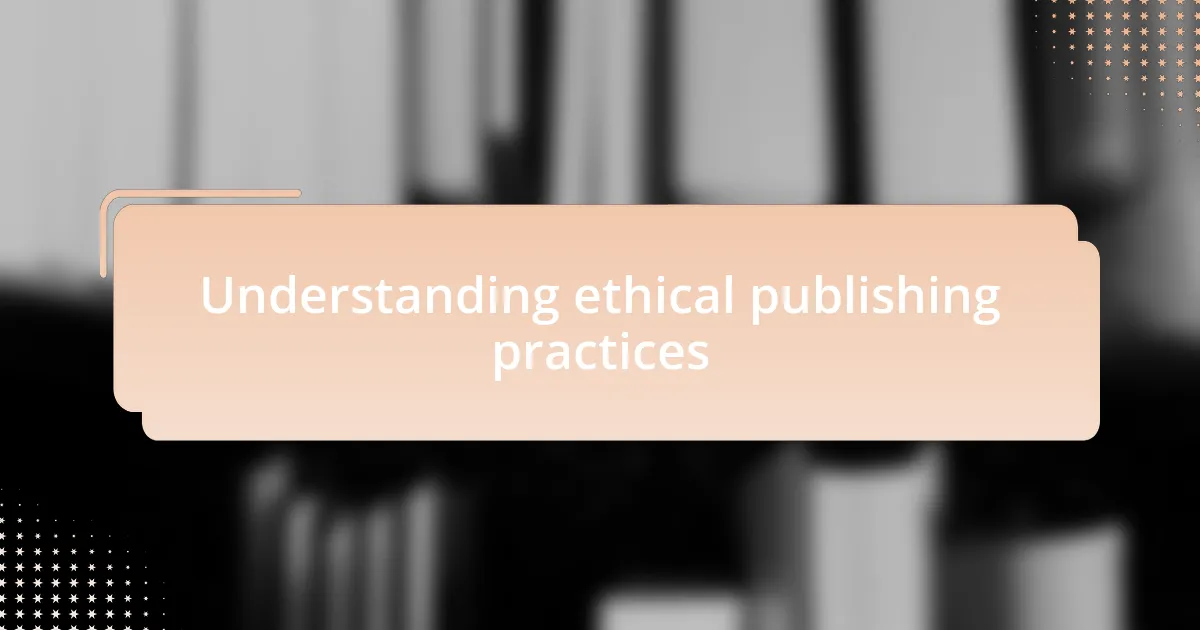
Understanding ethical publishing practices
Ethical publishing practices are essential for maintaining integrity in academic research. I remember first grappling with this concept during a seminar where a guest speaker emphasized transparency. It struck me that openness fosters trust not just among researchers, but also with the public, leading to a healthier academic environment.
One of the key aspects of ethical publishing is ensuring that all contributors receive appropriate credit for their work. I’ve seen firsthand how neglecting this can create rifts among collaborators. It made me wonder—how can we expect future generations to uphold ethical standards if we don’t start by honoring those who helped pave the way?
Furthermore, safeguarding against plagiarism is vital to uphold originality and respect for intellectual property. Reflecting on my early writing days, I learned the hard way that good research involves more than collecting data; it’s about presenting it with respect for its source. Isn’t it our responsibility to ensure that every voice is heard and credited?
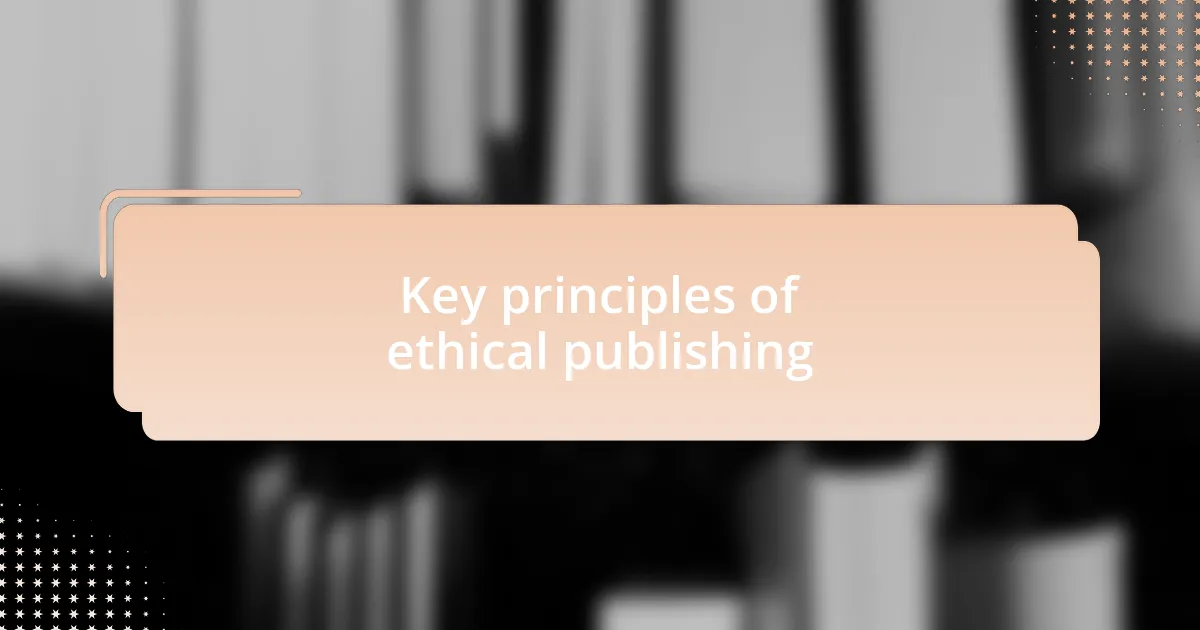
Key principles of ethical publishing
One of the key principles of ethical publishing is the commitment to rigorous peer review. I vividly recall my first experience as a reviewer—it was both exciting and daunting. The responsibility to evaluate a colleague’s work pushed me to dig deeper into my own understanding while reminding me of the collaborative spirit in academia. How can we foster strong research if not through constructive feedback that honors the effort and intellect of those we critique?
Transparency in funding sources and potential conflicts of interest is another critical pillar. I once attended a conference where a researcher openly discussed funding biases in their work. That moment resonated with me—acknowledging financial influences can enhance credibility, as it shows honesty about potential biases. Isn’t it fascinating how openly addressing these issues can strengthen trust within the research community?
Lastly, taking responsibility for reporting research findings truthfully cannot be overstated. I remember presenting my findings at a symposium and facing questions about unexpected results. Instead of glossing over the data, I embraced the challenge of explaining it honestly. Isn’t it our duty to present not just the successes, but also the uncertainties and failures that are part of the research journey? This honesty lays the groundwork for genuine advancements in knowledge.
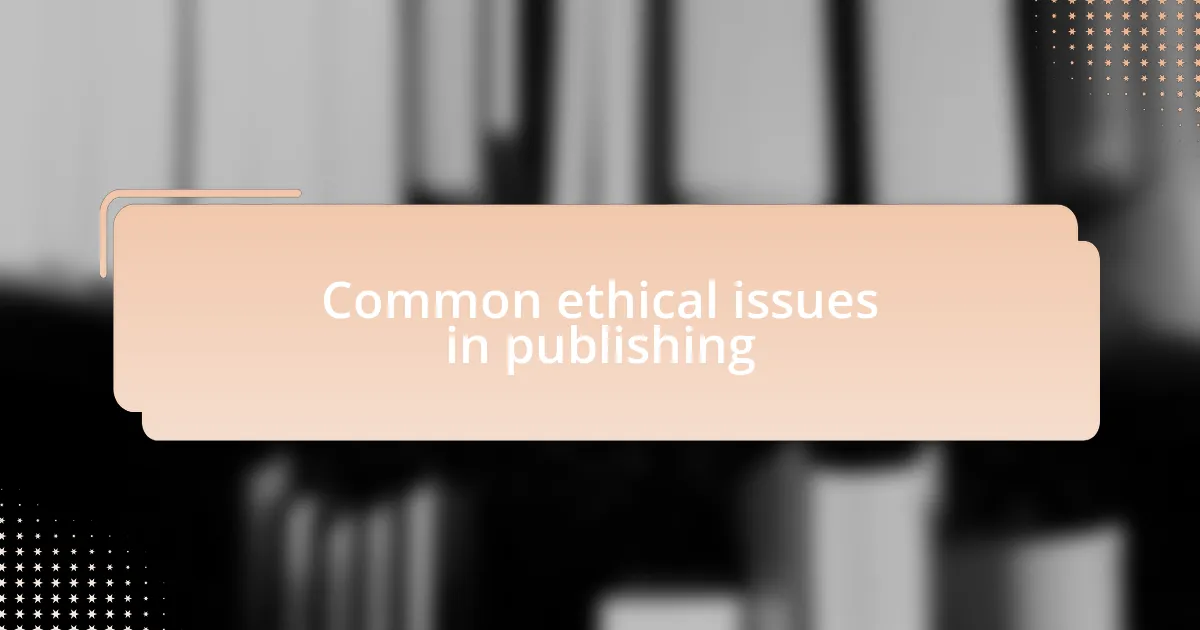
Common ethical issues in publishing
One of the most pressing ethical issues in publishing is plagiarism. I remember a colleague whose groundbreaking research was nearly overshadowed by an allegation of unintentional plagiarism. It was a painful lesson for all involved, reminding me of the thin line between inspiration and appropriation. How can we ensure our ideas remain authentic and respected when the stakes are so high?
Another significant concern is the manipulation of authorship. During my career, I witnessed a situation where a highly regarded researcher was credited as an author for a paper he barely contributed to, while the actual contributors went unrecognized. This struck me as deeply unfair. Why should recognition be diluted when each individual’s hard work deserves its rightful place in the spotlight?
I have also encountered challenges surrounding data fabrication and falsification. A friend of mine faced the scrutiny of his peers after anomalous results prompted a deeper investigation into his data practices. It’s crucial to realize that honesty in our research is not just about avoiding consequences but about preserving the integrity of the scientific record. Isn’t it disheartening to see one unethical act potentially tarnish the efforts of many hardworking researchers?
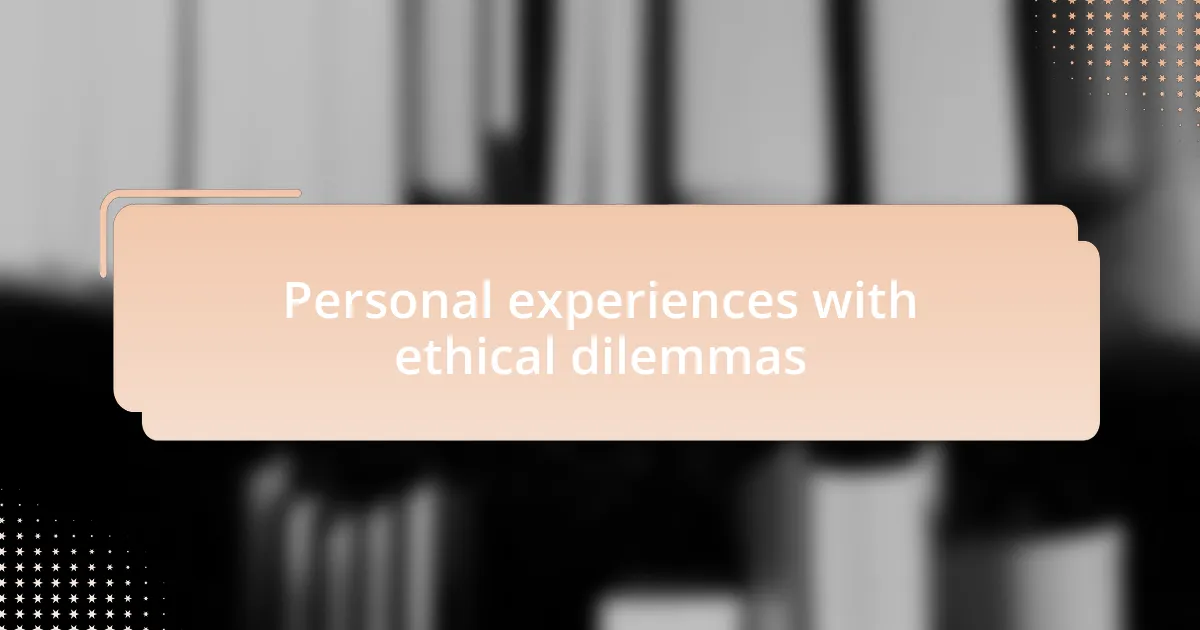
Personal experiences with ethical dilemmas
I’ve faced my own ethical dilemmas during the peer review process. One time, I reviewed a manuscript that presented some compelling findings but heavily relied on data from studies without proper citation. As I sat there writing my feedback, I felt a mix of frustration and concern. How could I balance my responsibility to uphold ethical standards while also recognizing the importance of the research? Ultimately, I chose to address these issues honestly, but it felt like walking a tightrope.
Another experience that sticks with me involved a young researcher who approached me for advice on his work. He was unsure whether to include data that hinted at less favorable outcomes. I remember vividly how his eyes reflected a mix of anxiety and hope. I encouraged him to be transparent, reminding him that true scientific progress often comes from facing uncomfortable truths. Isn’t it fascinating how moments like these can shape our understanding of what it means to be ethical in our field?
I’ve also encountered situations where funding sources influenced research outcomes in subtle ways. I recall a project where the financial backing seemed to put pressure on the team to highlight favorable results while downplaying any negative findings. That experience raised a significant question for me: How do we maintain our integrity when external influences seem to cloud our judgment? This dilemma pressed me to advocate for transparency in funding disclosures, a practice that should be a norm rather than an exception in our field.
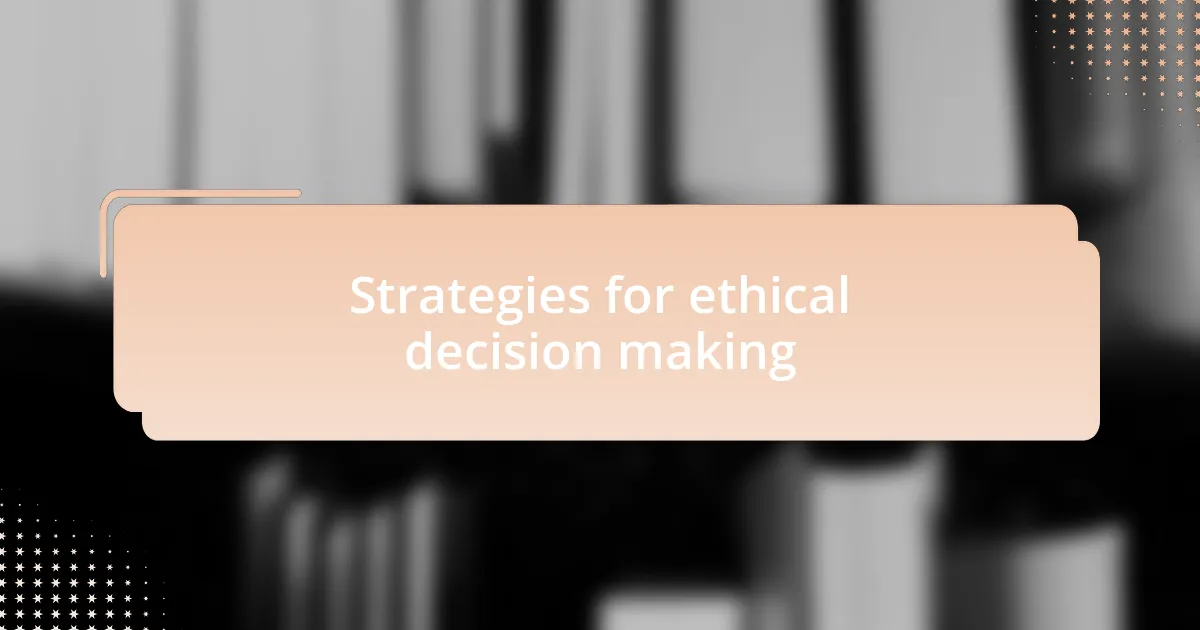
Strategies for ethical decision making
When making ethical decisions, I find that establishing a clear set of values can serve as a guiding star. In my experience, creating a personal code of ethics ensures that I remain consistent in my choices, especially during the pressure of tight deadlines or competing interests. Have you ever felt the weight of a decision hanging over you? It can be overwhelming, but grounding myself in my core principles helps clarify the right path forward.
Collaboration is another effective strategy I’ve employed. Engaging in open discussions with colleagues about potential ethical dilemmas can shed light on perspectives I might not have considered. For instance, during a particularly heated debate regarding author contributions, gathering insights from diverse voices helped me navigate the complexities more thoughtfully. It’s incredible how much light can be shed just by inviting others into the conversation—do you agree?
Lastly, seeking mentorship has proven invaluable in my journey. I often reflect on my early days in academia when a seasoned researcher took the time to guide me through ethical challenges. Their wisdom taught me to approach decisions analytically, weighing the implications on both the research community and society at large. It’s a reminder that we’re not alone in this; every mentor’s experience can offer a roadmap through the gray areas of ethics. Isn’t that a comforting thought?
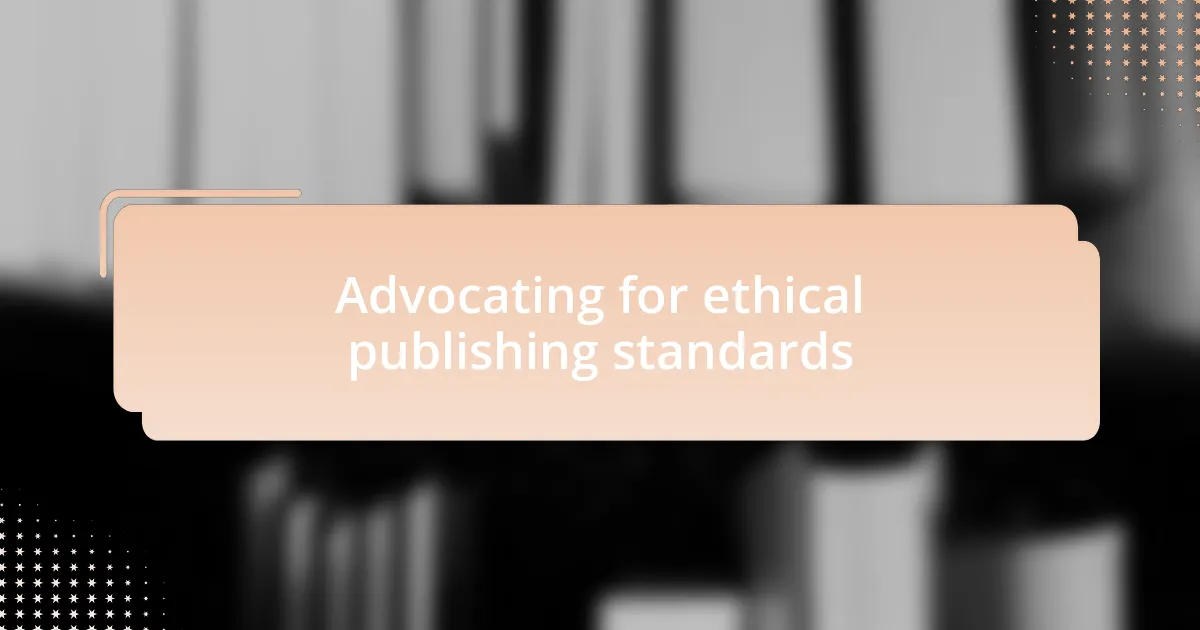
Advocating for ethical publishing standards
Advocating for ethical publishing standards is crucial, especially in an environment where pressures can skew decision-making. I remember attending a conference where a panel discussion focused on the challenges of plagiarism. Listening to personal stories from authors who had faced severe repercussions ignited a passion in me to promote transparency and integrity in our publications. Has there ever been a moment when you recognized the profound implications of an ethical lapse?
Establishing clear guidelines for ethical practices isn’t just about avoiding misconduct; it’s about fostering a culture of respect and fairness. In my experience, when journals prioritize ethical publishing, they set the stage for authentic scholarship. This not only enhances the credibility of the research but also builds trust among authors, reviewers, and readers. I often think about how much stronger our academic community can be when everyone adheres to these shared values.
Moreover, engaging early-career researchers in discussions about ethical publishing can shape their future conduct significantly. I vividly recall a workshop designed for novice scholars where we worked through case studies of ethical breaches. The energy in that room was palpable—questions flowed freely, and perspectives collided. It was inspiring to see participants commit to upholding ethics in their work, a testament to how powerful open dialogue can be in building a principled foundation for the next generation of academics. How do you think these conversations influence their outlook on research integrity?